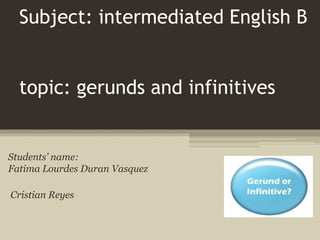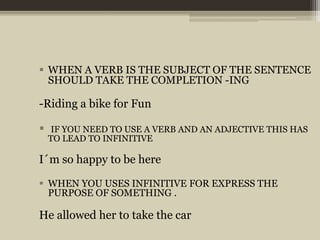Presentation of gerund of infinitives
- 1. Subject: intermediated English B topic: gerunds and infinitives StudentsŌĆÖ name: Fatima Lourdes Duran Vasquez Cristian Reyes
- 2. Introduction Gerunds and verbs that act like nouns. They can follow adjectives and and other verbs; gerund can also follow preposition . A gerund often know as an-ing words) is a noun formed from a verb by adding- ing. Not all words formed with-ing are gerunds. An infinitive is to +the verb. A verb is an action word. In English, if a verb starts with the word ŌĆ£to,ŌĆØ it is an infinitive. If a verb ends with ŌĆ£ing,ŌĆØ it is a gerund. Verbs can be either gerunds or infinitives, but they canŌĆÖt be both! When a verb follows a verb it either takes the gerund or infinitive form Some verbs can take either the gerund or the infinitive with no loss of meaning
- 3. Gerunds are often used when action are real, concrete or completed Some verbs can be followed by the infinitive with to or the ŌĆōing form The meaning is usually the same,gerunds it is a noun made from a verb by adding-ing Walking ŌĆō talking - thinking - listening You can use it as: ŌĆó The subject : reading helps you learn English ŌĆó The complement: her favorite hobby is reading ŌĆó the object of a sentence: I like reading ’ā╝ can be negative by adding not Examples: he enjoys not working The best thing for your health is not smoking
- 4. Usually the main verb in the sentences determines wheter you use a gerund or infinitive Both gerunds and infinitives can be used as the subject or the complement of a senteces ,however as subject or complements gerund usually sounds more like normal, spoken English where infinitives sound more abstract. Usually the main verb in the sentences determines wheter you use a gerund or an infinitive. Enjoy requires a gerund Want requires an infinitive
- 5. Infinitives are often use when action are unreal, abstract Subject: To learn is important the grammar The complement: the most important thing is to learn The object of a sentence: he want to learn
- 6. Gerund are used as subject or the object of the sentence Smoking is bad for your health My job involves doing a lot of hours Only gerunds can be the object of preposition Example: we are talking about writing in english
- 7. Sometimes the use of the gerund or infinitive change the meaning of the sentences ’é¦ I remembered doing my homework ’é¦ I remember to do my homework
- 8. A gerund is a verbal that ends in-ing ŌĆó Funtions as noun;the verbal indicates that a gerund is based on a verb and therefore express action. ŌĆó Go + ing form ŌĆó Sometimes use go + -ing form to talk about doing sports and other activity: ŌĆó Example: surf-go
- 9. Infinitives often follow verbs that indicate that an action will or could happen The action expressed by the verb comes before the action expressed by the infinitive. -We hope to go the concert Verbs that are followed by noun phrase infinitive and can also be follow by a gerund : The gerund makes it general and the infinitives make specific the person indicated -They allow smoking in the house -They allowed me to smoke in the house
- 10. Verbs and expressions followed by infinitive mental state or activity: agree, choose,decide,remember Future arrangements: aim, arrange,expect,refuse Gerund infinitive Working to work Playing to play Studing to study
- 11. VERB THAT CAN BE FOLLOWED BY A GERUN OR INFINITIVE ’ü▒ Gerund he continues working in the same company ’ü▒ Infinitive she continues to work in the same company VERB THAT CAN ONLY BE FOLLOWED BY A GERUND ’ü▒ Gerun heŌĆÖs practiced playing the piano ’ü▒ Infinitive heŌĆÖs practiced to play the piano VERB THAT CAN ONLY BE FOLLOWED BY AN INFINITIVE ’ü▒ Gerund she learned swimming ’ü▒ Infinitive she learned to swim
- 12. ’é¦ WHEN A VERB IS THE SUBJECT OF THE SENTENCE SHOULD TAKE THE COMPLETION -ING -Riding a bike for Fun ’é¦ IF YOU NEED TO USE A VERB AND AN ADJECTIVE THIS HAS TO LEAD TO INFINITIVE I┬┤m so happy to be here ’é¦ WHEN YOU USES INFINITIVE FOR EXPRESS THE PURPOSE OF SOMETHING . He allowed her to take the car













